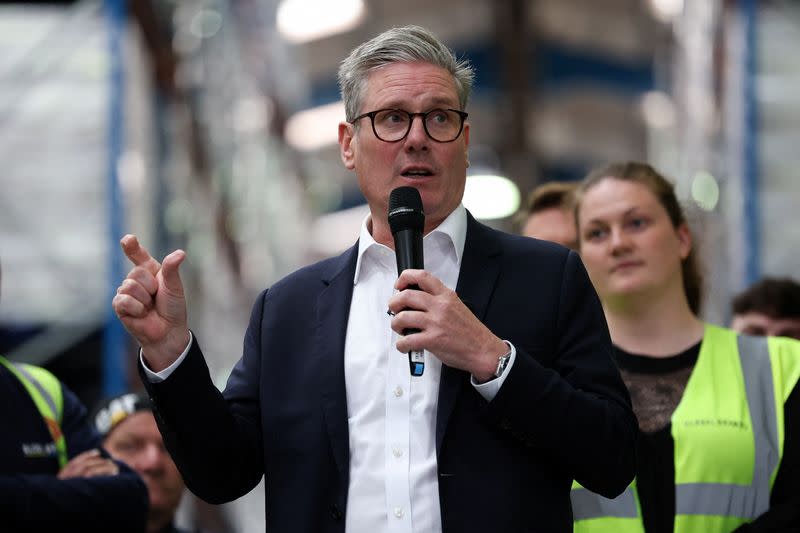Factbox-UK election: What are Labour's foreign policy plans?

LONDON (Reuters) - Britain's Labour Party is expected to win Thursday's national election, returning to power after 14 years in opposition and making Keir Starmer the country's new prime minister.
Below are the foreign policy plans the party set out in its manifesto ahead of the vote:
EUROPEAN UNION
Labour has promised Britain will stay outside of the EU, with no return to the single market, the customs union, or freedom of movement of people.
But eight years after Britain voted to leave, it wants to reset the relationship with the bloc and seeks to deepen ties including by removing what it calls unnecessary barriers to trade.
It has said it wants to negotiate a veterinary agreement to prevent unnecessary border checks and secure a mutual recognition agreement for professional qualifications.
Labour plans to seek a new UK-EU security pact to strengthen co-operation and rebuild relationships with key European allies, including France and Germany. It will also seek new bilateral agreements.
ECHR
Labour said Britain would remain a member of the European Convention on Human Rights.
NATO
Labour has said its commitment to NATO as the cornerstone of European and global security is "unshakeable".
It plans to work with allies to build, strengthen and reform NATO and other multilateral institutions including the UN, G7, G20 to address new global challenges.
RUSSIA/UKRAINE
Labour has pledged to maintain Britain's military, financial, diplomatic and political support for Ukraine.
It said it would support efforts to hold Russia to account for the war, backing calls for a Special Tribunal for the Crime of Aggression as well as working with allies to enable the seizure and repurposing of frozen Russian state assets to support Ukraine.
Labour also said wants to help provide Ukraine with a clear path to NATO membership.
MIDDLE EAST
Labour has said long-term peace and security in the Middle East would be an immediate focus.
It said a Labour government would continue to push for an immediate ceasefire in Gaza, the release of all hostages, the upholding of international law, and a rapid increase of aid into the territory.
The party has committed to recognising a Palestinian state as a contribution to a renewed peace process which results in a two-state solution. It has described Palestinian statehood as "the inalienable right of the Palestinian people" and said it was essential to the long-term security of Israel.
UNITED STATES
Labour described the United States as an "indispensable ally".
It said the so-called special relationship was crucial for security and prosperity, and it would continue to work with the United States on the basis of shared values and common interests including on economic co-operation, defence and intelligence.
CHINA
Labour has said it would bring "a long-term and strategic approach" to managing Britain's relations with China.
It said it would "co-operate where we can, compete where we need to, and challenge where we must."
The party said it would look to improve Britain's capability to understand and respond to the challenges and opportunities China poses through an audit of the bilateral relationship.
It also said it would stand with and support members of the Hong Kong community who have relocated to the UK.
INDIA
Labour said it would seek a new strategic partnership with India, including a free trade agreement. It also plans to deepen co-operation in areas including security, education, technology and climate change.
AUKUS
Labour has said it is fully committed to the AUKUS security partnership between Britain, Australia and the United States.
It wants to ensure the agreement delivers its full economic and security potential by increasing jobs and investment across Britain.
FALKLANDS AND GIBRALTAR
Labour has said it would protect British Overseas Territories and Crown Dependencies, including the Falklands and Gibraltar, and defend their sovereignty and right to self-determination.
INTERNATIONAL DEVELOPMENT
Labour has committed to restoring development spending to 0.7% of gross national income "as soon as fiscal circumstances allow".
TRADE
Labour intends to seek new free trade agreements as well as standalone sector deals, such as digital, or mutual recognition agreements, to promote services exports.
Labour has also said it would lead international discussions to modernise trade rules and agreements, promoting deeper trade and co-operation including through the World Trade Organization and the Comprehensive and Progressive Agreement for Trans-Pacific Partnership.
It supports implementation of the OECD global minimum rate of corporate taxation and said it backs international efforts to make sure multinational tech companies pay their fair share of tax.
(Reporting by Kylie MacLellan; Editing by Alistair Smout and Toby Chopra)

 Yahoo News
Yahoo News 
